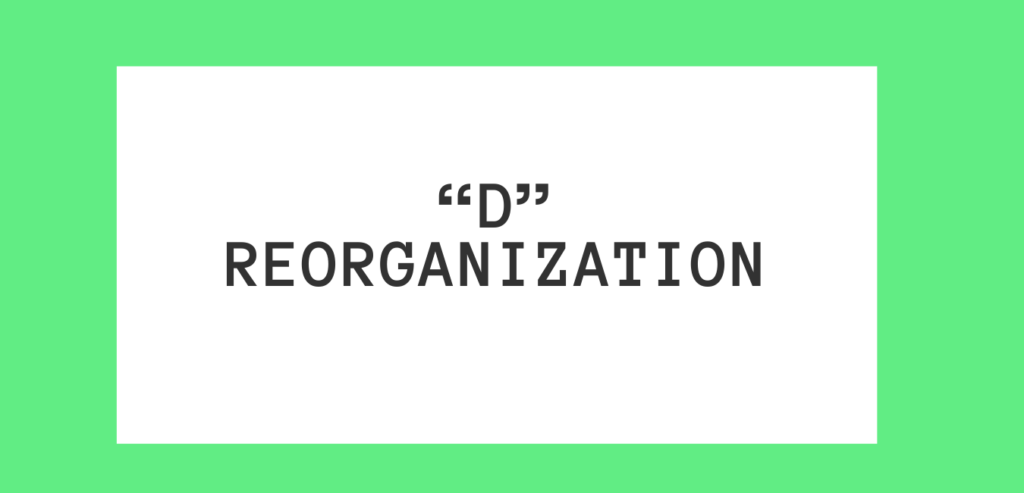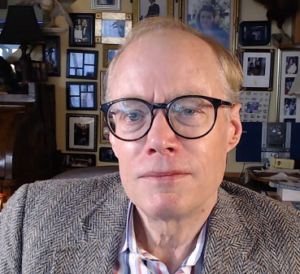“D” Reorganization

“D” reorganization: “Spin-off” and “Split-off”
acquisitive d reorganization “D” Reorganization
Explanation:
* Corporate T contains the assets of former corporation A and of T.
* Corporation A goes out of existence Corporation A’s shareholder’s control Corporation T.
Requirements for Divisive “D” d reorganization requirements imposed by IRC §355
* Distribution of Control -by the original corporation to its shareholders
* Character of Distribution – stock or securities of the newly created subsidiary.
* Active Business Immediately -original corporation and the controlled subsidiary.
* Not as Tax Avoidance Device.
Spin-Off (Divisive I’D” type d reorganization)
Explanation:
A spin-off is the same as a split-off (see Exhibit 7-10), except that A’s shareholders receive shares of B stock, but do not turn in any of their shares of A stock. The spin-off transaction is often used when management decides that corporate operations should be divided but the shareholders want to continue investment in both the original and new corporation.
Split-Off (Divisive ” D” Reorganization)
When shareholders prefer different investments in the future operations of the corporation, a split-off is used. In a split-off, the original corporation transfers some of its assets to a newly formed subsidiary in exchange for all of the subsidiary’s stock, which it then distributes to some or all of its shareholders in exchange for some portion of their original stock. As a result, the two corporations are held by the original shareholders but in a proportion that differs from that which they held in the original corporation.
Explanation:
* A Corporation transfers part of its assets to B Corporation in exchange for B corporation stock.
* A’s shareholders exchange part of their A stock for B stock.
Split-up (Divisive “D” divisive d reorganization)
Explanation:
* A Corporation transfers all of the bassets to B and C Corporations in exchange for all of the stock of B and C.
* A Corporation then exchanges all of the B and C stock for its own stock and a dissolves.
* After the reorganization, A no longer exists, and A’s shareholders are now the shareholders of B and C Corporations.
Proceed to “EFG” Reorganization
To receive our free newsletter, contact us here.
Subscribe our YouTube Channel for more updates.

Alan Olsen, is the Host of the American Dreams Show and the Managing Partner of GROCO.com. GROCO is a premier family office and tax advisory firm located in the San Francisco Bay area serving clients all over the world.
Alan L. Olsen, CPA, Wikipedia Bio

GROCO.com is a proud sponsor of The American Dreams Show.

The American Dreams show was the brainchild of Alan Olsen, CPA, MBA. It was originally created to fill a specific need; often inexperienced entrepreneurs lacked basic information about raising capital and how to successfully start a business.
Alan sincerely wanted to respond to the many requests from aspiring entrepreneurs asking for the information and introductions they needed. But he had to find a way to help in which his venture capital clients and friends would not mind.
The American Dreams show became the solution, first as a radio show and now with YouTube videos as well. Always respectful of interview guest’s time, he’s able to give access to individuals information and inspiration previously inaccessible to the first-time entrepreneurs who need it most.
They can listen to venture capitalists and successful business people explain first-hand, how they got to where they are, how to start a company, how to overcome challenges, how they see the future evolving, opportunities, work-life balance and so much more..
American Dreams discusses many topics from some of the world’s most successful individuals about their secrets to life’s success. Topics from guest have included:
Creating purpose in life / Building a foundation for their life / Solving problems / Finding fulfillment through philanthropy and service / Becoming self-reliant / Enhancing effective leadership / Balancing family and work…

MyPaths.com (Also sponsored by GROCO) provides free access to content and world-class entrepreneurs, influencers and thought leaders’ personal success stories. To help you find your path in life to true, sustainable success & happiness. It’s mission statement:
In an increasingly complex and difficult world, we hope to help you find your personal path in life and build a strong foundation by learning how others found success and happiness. True and sustainable success and happiness are different for each one of us but possible, often despite significant challenges.
Our mission at MyPaths.com is to provide resources and firsthand accounts of how others found their paths in life, so you can do the same.
Robert Zuccaro – How Wall Street Reshaped America’s Destiny
Robert Zuccaro interview transcript, “How Wall Street Reshaped America’s Destiny”: Alan Olsen: In 2011 thousands of people gathered in the New York’s Financial district the to protest. The movement became known as, Occupy Wall Street. At the time, the economic collapse of 2008 as well as the huge government bail outs were fresh in the…
What Topics Should One Avoid While At Work?
Topics to Avoid at Work Have you ever been around a person who feels like he or she needs to tell you everything about themselves? Someone who reveals way too much personal information, can make others feel uncomfortable. We all have many sides to our lives and our personalities, and some people are more open…
Robert Wood – Founder of Wood LLP
Robert Wood, Founder of Wood LLP interview transcript: Alan Olsen: A lot of time Personal Injury Lawsuits are taken on a contingent fee basis. When a person is awarded great lawsuit settlement, oftentimes after the attorney takes their fee from the lawsuit settlement a the plaintiff gets a tax form in the mail saying they…
Is Philanthropy Good for Capitalism?
Is Philanthropy good for capitalism? In 2013 Zoltan J. Acs wrote the book Why Philanthropy matters. It explores the benefits of Philanthropy on the US economy; “…philanthropy as an underappreciated force in capitalism, measures its critical influence on the free-market system, and demonstrates how American philanthropy could serve as a model for the productive reinvestment…




